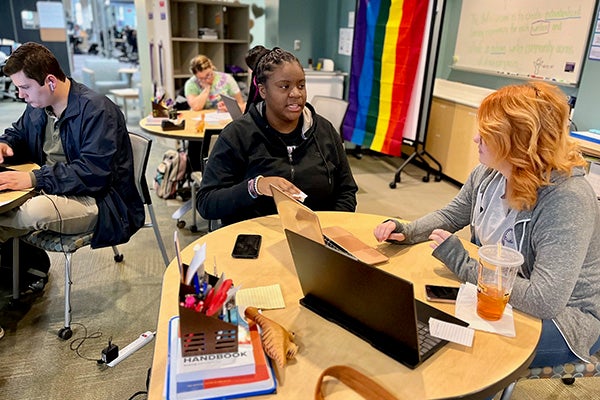University Writing Center celebrates 10 years of student support, community success
Sharing in East Carolina University’s mission, the University Writing Center (UWC) strives to serve the public and assist in student success, a goal that the faculty, staff and students are celebrating this spring during the center’s 10th anniversary.
The center was built in 2013 as part of the university’s Quality Enhancement Plan (QEP), “Write Where You Belong,” for regional accreditation by the Southern Association of Colleges and Schools Commission on Colleges. The center, in Room 1009 on the first floor of Joyner Library, falls under the University Writing Program, which is comprised of four interrelated projects: writing foundations, writing across the curriculum, the university writing center, and the Tar River writing project.
Will Banks, director of the University Writing Program and professor of English in the Thomas Harriot College of Arts and Sciences, said that prior to 2013 there was no dedicated space for the writing center, which caused problems in creating stable hours and online options. The provost and chancellor supported the writing center as part of the QEP.

Sarah Howard, center, talks with University Writing Center student employee Cassidy Barbee at the center. (ECU photos by Ronnie Woodward)
“The university thought students needed a space for support,” Banks said, “and they found funding for the $750,000 remodel project in Joyner Library for the University Writing Program and writing center.”
The UWC supports student, faculty and staff on writing projects — including classroom and non-classroom-based projects — through one-on-one and small-group consultations. Staff lead classroom workshops, create Canvas models for digitized workshops, provide supporting documents on the website and will soon launch lunch-and-learns for outreach to campus organizations.
Face-to-face or online consultations are led by 20 to 30 ECU students each semester who are hired as consultants and trained by the UWC. Student employees of the center participate in and receive continuing professional development in writing skills.
“Getting the opportunity to work with a variety of different students on their writing has been one of the privileges of my time at ECU,” said Reagan Blackburn, a senior pursuing dual majors in theatre arts and communication with a concentration in public relations. “Of course, part of my job is to help students with their writing, but more importantly, I am there to empower them. No one is a bad writer; it’s all about finding your voice and fine-tuning the story you want to tell. If I can help them get closer to that realization by even the smallest percentage, I have done my job well.”
According to Nikki Caswell, director of the UWC and associate professor of English, the center offers up to 250 appointments per week, and student employees are eager and excited to help writers communicate effectively with their audiences.
“One of the major accomplishments of the center is building students’ writer confidence,” Caswell said. “They come into the center thinking they are bad writers. We help students feel good about their writing, which then translates into other academic successes.”
Building professionalization
Banks said another impact of the center is the professionalization it provides to their student employees, also referred to as consultants.
“Our consultants go through weekly professional development and a substantial onboarding process. They read the research about writing and composing, and they engage in their own research projects based on work with their peers,” Banks said.
For example, during and after the COVID-19 pandemic, some students began to worry about their peers’ mental health, which led them to research what they could do to support other students who are struggling.
While the UWC works primarily with students, it also supports faculty and staff writers on a host of genres and projects, and the center has engaged in various community writing and literacy projects that are central to personal, professional and economic development in eastern North Carolina.
For the past three years, the center has provided community members with support in resume and cover-letter writing as well as non-professional writing consultation. Prior to the pandemic, the center also worked with local organizations to host community workshops. Now, the center is applying for a grant with the goal of holding more community workshops in the future.
“We saw different types of writing that we didn’t see in the academic space, and the consultants really enjoyed that,” Caswell said. “We want to refocus on our community outreach because helping the community also helps the campus. It is a reciprocal relationship.”
Visit the center online for additional information about its hours and services.